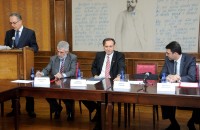 Promotion of the Nordic model of cooperation in Podgorica organized by the Igman Initiative in Montenegro was held at the Faculty of Law in Podgorica. Many prominent individuals from the political and public life took part in the event, including Ranko Krivokapic, President of the Parliament of Montenegro. One of the main questions raised on that occasion was about the possibility to create a new type of union between countries established after the break-up of Yugoslavia on a new basis, including the question of applicability of the model which was developed by Nordic countries sixty years ago. Today, within the EU, Nordic countries jointly approach spheres and policies which are especially important for their citizens. Like Nordic countries, Balkan countries had suffered various conflicts and wars. However, unlike Balkan countries, Nordic countries had put it all behind as a matter of distant past, mostly thanks to the unity created through the Nordic Council.
Promotion of the Nordic model of cooperation in Podgorica organized by the Igman Initiative in Montenegro was held at the Faculty of Law in Podgorica. Many prominent individuals from the political and public life took part in the event, including Ranko Krivokapic, President of the Parliament of Montenegro. One of the main questions raised on that occasion was about the possibility to create a new type of union between countries established after the break-up of Yugoslavia on a new basis, including the question of applicability of the model which was developed by Nordic countries sixty years ago. Today, within the EU, Nordic countries jointly approach spheres and policies which are especially important for their citizens. Like Nordic countries, Balkan countries had suffered various conflicts and wars. However, unlike Balkan countries, Nordic countries had put it all behind as a matter of distant past, mostly thanks to the unity created through the Nordic Council.
In the opening word before the beginning of this presentation, Branko Lukovac, co-president of Igman Initiative in Montenegro, pointed out that Balkan countries, just like Nordic countries, have similar geography, social system, culture, tradition and therefore this Nordic model, among all other known models of integration in Europe, seems to be the most applicable. Nordic model of cooperation includes removal of all obstacles in free flow of people, goods and business, as well as integrated social policy and protection, which are probably the best in the world. In his opinion, countries of West Balkans should also set-up a body with a role similar to the role of the Nordic Council founded after the WWII.
“We believe that we too should aim at setting up a new form of regional council on a high level, similar to what they have. For this purpose, it is important and necessary to establish, as soon as possible, an inter-parliamentary body for instigation and steering of cooperation between the four countries signatory to the Dayton Agreement” – Lukovac said.
Ranko Krivokapic, President of the Parliament of Montenegro, said: ”In Island, I’ve heard something very applicable to our case – like-minded children play together best. As you know, like-minded children had played a serious game in early 90s in the Balkans. All that was created by many generations in struggle ended up destroyed by incompetent, disoriented and historically disreputable leaders, in just one decade. Nordic peoples also had similar periods in their history. They too have big and little brothers. So, don’t be mistaken, challenge laid before us is not a bigger challenge than what they had. I am saying this because I want to encourage ourselves, not to diminish the significance of their historic achievement” – Krivokapic said.
While pointing out the nature of the moment when Igman Initiative started to work on application of positive experiences from the Nordic model of cooperation, Aleksandar Popov, co-president of Igman Initiative in Serbia said that Croatia’s accession to EU may cut off that country from the rest of the region and cast doubt upon the continuation of the process of rebuilding trust and understanding, i.e. overall normalization of mutual relations. However, he believes that this won’t be a problem. He explained:
”That is why Nordic model is important, having in mind that not all Nordic countries are EU member states, as well as that not all are members of the NATO. However, that does not affect their complete openness for free circulation of goods, people and ideas”.
Nordic countries believe that their model can be applicable in the Balkans, but it depends for the most part on the governments’ willingness to associate on the basis of that model or any other model, as Roger Jorgansen, First Secretary of the Royal Embassy of Norway in Belgrade, said on the occasion.
“It is not up to me to tell you which model to use in your regional cooperation. No one from the outside can dictate to you how to devise and enforce a strong, good cooperation. But, it is important to bear in mind that the substance of that cooperation is more important than its form” – Jorgansen said.

